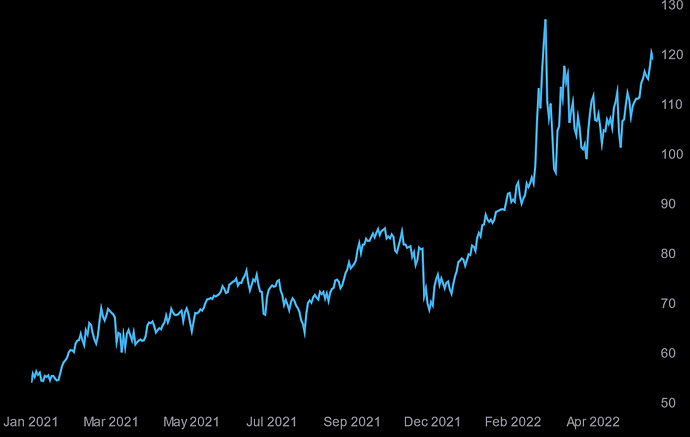The RAC has a breakdown (for E10):
The number they have used for the cost of petrol is inline with the average price of Super Unleaded E5 found in the AA’s April survey, the most recent validated data source I was able to identify.
Duty and VAT are well know; pre-2022 Spring Budget, the duty rate was 57.95 pence per liter irrespective of petrol grade. VAT is levied at 20% on both duty and the actual cost of the fuel.
So, from this, we know pure petrol is a shade under 0.1 pence per ml. Bioethanol though is more than double, at almost 0.24p pence per ml.
The EU derives pretty much all of its bioethanol from agricultural waste, via half a dozen companies or so, and I think most of that waste originates in the EU. In the UK, until quite recently, most bioethanol came from sugar, supplied by British Sugar, grown in the UK or in Mauritius, Zambia and other places, or wheat, a big chunk of which I suspect comes from Ukraine-Russia… I think there is some waste-derived ethanol being added now though. Most US bioethanol comes from corn. Sugar is a commodity, and commodity prices have increased. On the other hand agricultural waste, until recently, didn’t have any value (it was waste, and represented a cost of something to be got rid of). That might be change now; waste now have a value, and will be traded. Nevertheless, instinctively, the UK is probably paying more per unit for ethanol compared to the EU.
E10 contains upto twice as much ethanol as E5; we know some brands of E5 contain no bioethanol. This is more profitable for the oil companies; profit from bioethanol does not go to the oil companies. They don’t produce bioethanol. They have to buy this in from someone else who is making a profit. But for E10, there is less dino fuel per liter than E5, and the result is a 4-5 pence reduction in how much dino petrol is in your liter of E10, compared to E5. That’s 4-5 pence NOT going to an oil company (with the notable exception of Vivergo, part owned by BP). But in E10, the cost element of bioethanol doubles (5% to 10%). E10 is more expensive to make than E5, but costs less at the pump. E5 sales are subsidizing E10. But in other (more important ways), E10 is less costly. Every liter of E10 means less usage of fossil carbon, and more usage of biogenic carbon, eventually bringing the carbon cycle more towards equilibrium (ie. reducing the accumulation of carbon dioxide, because of an inbalance in the reduction/oxidized phases.}.
Here is what is interesting. There is a lot of R&D that goes in to extract oil; to find new sources, to get it out of the ground, to transport it. But what about bioethanol. It uses literally the oldest chemistry known to man; fermentation. We let biology do the heavy lifting. We can tweak things a bit, through genetic selection, enzymology etc. We are not running out of the feedstock (quite the oppositve). Where you are using something that has to be grown, like sugar beets/cane or corn, there are other inputs, and oil is likely to be needed (fertiliser production).
British Sugar is part of Associated British Foods, over half of which is owned by Whittingham Investments. Interestingly, almost 80% of this is owned by a Canadian charity, the Garfield Weston Foundation. ABF’s financials are pretty small fry compared to the oil companies, and revenue is down, not up, because of course, they have a more complex portfolio of products than the oil companies. But I can see these companies becoming more in the public eye. Most would be oblivious to the names of these companies
